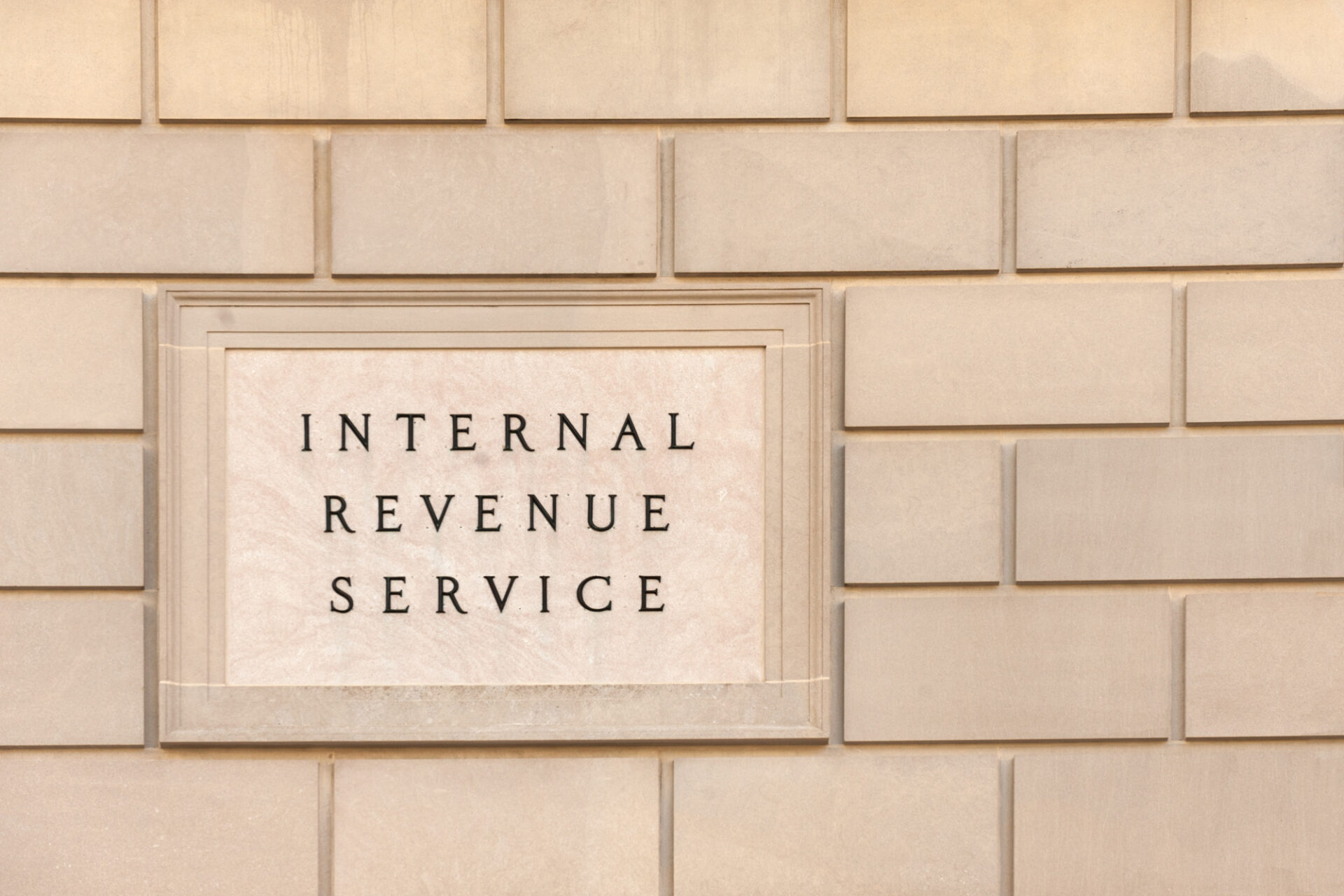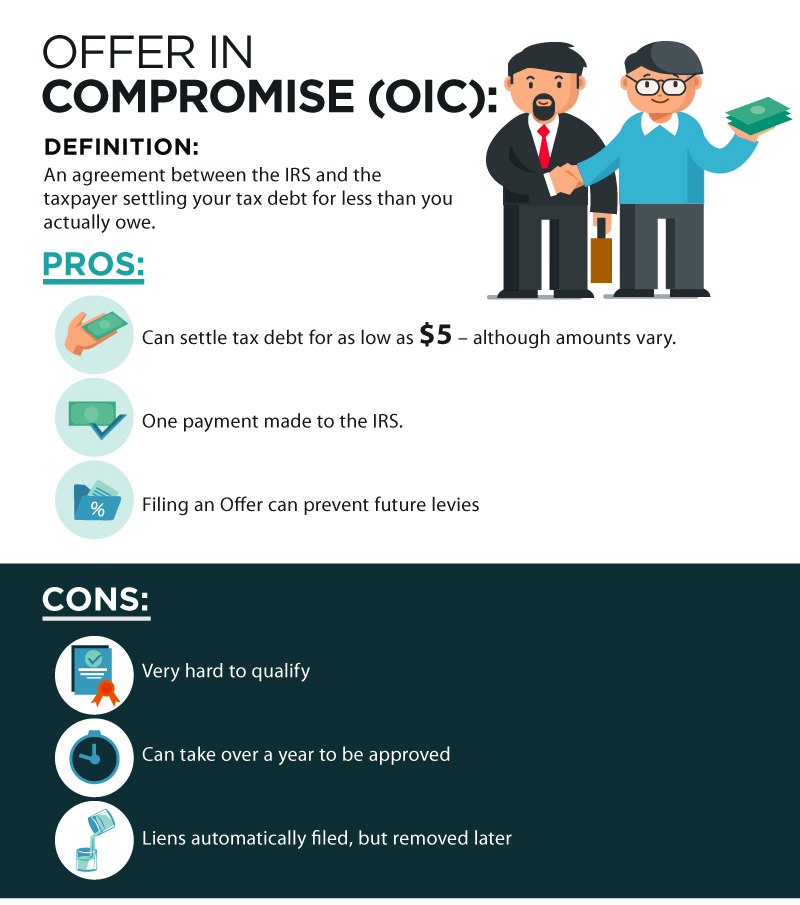
100+ Years of Combined Tax Resolution Experience.
100+ Years of Combined Tax Resolution Experience.
Have you accumulated a large tax liability and it feels like you have no way out? You may have received a notification stating that the IRS will place a levy on your bank account to collect on a tax balance.
There is a way to resolve your tax liability and get a fresh start. That’s through the IRS offer in compromise program.
It’s a complex program that’s often misunderstood. Read on to learn what the offer in compromise program is and how you can get your offer approved.
Table of Contents
What is an Offer in Compromise?
Effective tax administration is when you know the liability is yours, you have the resources to pay, but there are special circumstances that prevent you from paying.
The offer in compromise program has been around for quite a while as part of the Fresh Start Program. This is a program that helps taxpayers pay off their taxes and get a fresh financial start.
The IRS will evaluate your income, assets, monthly expenses, and your overall financial picture to figure out if you can pay your balance or not.
The rules changed in 2012 that allows the IRS to look at your financial picture over the last 12 months. Prior to that, the IRS would look at the previous 5 years. This is a major change that would improve your chances for approval if you had a sudden drop in income.
There are three ways the IRS will look at the collectability of the liability.
Doubt as to liability is where you are disputing the amount of tax balance owed.
Doubt as to collectability is used when you acknowledge that the liability is yours, you just don’t have the ability to pay.
There are ads everywhere that talk about paying your IRS balance for pennies on the dollar. They’re actually referring to the offer in compromise program.
What they don’t mention is that it is a long and often difficult process. Most people don’t get their offers accepted by the IRS.
Getting an Offer Approved
How can you get your offer in compromise approved, especially with the odds against you? Follow these tips to help you get your offer approved.
Find Out If You Qualify
There are strict guidelines that the IRS uses to determine if you qualify. You had to have filed all of your taxes, paid your estimated taxes, and not be in the middle of a bankruptcy proceeding.
You can see if you qualify by going to the IRS website and use the Pre-Qualifier Tool. This is a general guideline that can help you determine if you qualify.
It’s important to remember that this is only a general guideline. Every situation is different. You should consult with a tax professional to determine if you qualify or not.
Submit the Application
There is a lengthy application process. The good news is that once you file your application, the collections activity will cease until a decision has been made.
You don’t want to submit an offer in compromise just to get collections activity to stop. The IRS will see through this and resume collections activities.
There are a number of forms that you need to fill out. Form 656 needs to be filled out for individuals. If you have a business such as a corporation, you will need to fill out an additional form 656 for your business.
Form 433 A is another form for individuals to complete. Form 433 B is for business.
Work with an Expert
The best way to get an offer approved is to work with a tax professional. Your offer in compromise application will be assigned a case manager at the IRS. They’ll pour over your information and decide if your tax liability is collectible or not.
An experienced tax professional may have worked with your case manager on other offer applications. That knowledge may be valuable because they know what the case manager is looking for and how information should be presented on your application.
A tax professional will also review your application before it’s submitted. This can prevent your offer from being rejected simply because the application wasn’t completely filled out. A blank line, even when the amount is zero could get your offer rejected.
After the Offer is Submitted to the IRS
What happens once an offer in compromise is submitted to the IRS? You wait.
You’ll get a notification from the IRS stating that they received your application. They may give you a timeline as to when.
You may get a notice from your case worker asking for more information. Don’t ignore this request. That will only give the IRS a reason to reject your application.
The IRS will communicate with you through the mail. You want to make sure that they have your current mailing address to ensure that you don’t miss any important requests or notices.
An offer in compromise can be returned to you, outright rejected, or accepted.
Offer Accepted
If your offer is accepted, you have a reason to celebrate. You also agree to pay and file taxes on time or the next five years. You have to notify the IRS of any changes, including address changes.
Offer Returned
Your offer may be returned because you were missing documentation, or your application wasn’t complete. You want to fix any errors and get your application back in as soon as possible.
Offer Rejected
Rejected offers are expected. You can file an appeal to the IRS within 30 days.
You may have to revise your offer or provide more documentation to prove that the IRS made a mistake in rejecting your offer.
The entire offer in compromise process can take anywhere from 6 months to more than two years.
Get a Fresh Start with the Offer in Compromise Program
Having a tax burden is not something that you can easily live with. You can get a fresh start by filing an offer in compromise. You make an offer to pay your tax liability for less than what you owe.
It’s a long and complicated process. You can’t afford to get your offer rejected, otherwise, the IRS will continue to collect on your balance.
Your best chance to get approved is to work with a team of tax professionals who understand the process. Contact us today to find out more about resolving your tax liability.
More on Offers in Compromise
Additional Readings

What if you owe so much in taxes that you can’t see your way out of it? If you owe back taxes, you might not think there is a way you can ever pay things off. And the more those back taxes have accumulated, the deeper the hole. But that doesn’t mean you can’t dig...

We see a lot of our clients going through a very difficult time when they come to us with their tax problems. Sometimes it is after a loved one has past or it is during a difficult divorce.

Have you accumulated a large tax liability and it feels like you have no way out? You may have received a notification stating that the IRS will place a levy on your bank account to collect on a tax balance. There is a way to resolve your tax liability and get a fresh start. That’s...

It has been just over a month since this year’s tax deadline, but that doesn’t mean taxes aren’t still on your mind. If you filed your 2017 federal tax return and were unable to pay the balance you owed, you likely are beginning to get collection notices from the IRS. Maybe this is the first...

We’re in an era in which more small businesses are launching like wildfire. Many people find starting a small business of their own as easy as a piece of cake. However, most of the time, what they fail to prioritize are some of the major players involved in smoothly operating their small business. A...

Do you know why most married taxpayers go for filing joint tax returns? It’s actually because of the benefits that it offers. But with joint tax returns, both the filers hold the responsibility for the tax bill or any penalties and interest that arise from it. Both are legally responsible for the entire liability, even...
